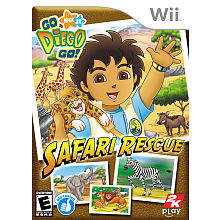Review: Go Diego Go! Safari Rescue (Wii)
Go Diego Go! Safari Rescue (Wii)
 “Based on Nickelodeon research with preschoolers and their families to determine how the platform’s motion-play capabilities are absorbed by younger children, Go, Diego, Go! Safari Rescue was designed with 13 intuitive Wii-centric motions that maximize the engineering of the Wii Remote for a preschooler. Taking on the role of Diego in a race across Africa, gamers stomp to scare away lions, jump with Baby Jaguar, paint stripes on zebras, climb up ladders and swim across the jungle river by mimicking those actions with the Wii Remote.” (from Metacritic)
“Based on Nickelodeon research with preschoolers and their families to determine how the platform’s motion-play capabilities are absorbed by younger children, Go, Diego, Go! Safari Rescue was designed with 13 intuitive Wii-centric motions that maximize the engineering of the Wii Remote for a preschooler. Taking on the role of Diego in a race across Africa, gamers stomp to scare away lions, jump with Baby Jaguar, paint stripes on zebras, climb up ladders and swim across the jungle river by mimicking those actions with the Wii Remote.” (from Metacritic)
After some research on the net, I decided that Safari Rescue was going to be the first game I tried to get Aidan to play on the Wii. I mean, sure, he likes holding the Guitar Hero guitar and watching the notes scroll by, but he’s not really playing.
The set up
A mosquito lands on a magic wand, turning it into a magician. The magician decides she doesn’t like elephants and turns them to stone. Well, some of them. Diego and Baby Jaguar have to find and use a magic drum that can turn the elephants back.
Seriously.
But, you know, we don’t have to really worry about characters’ motivation do we? It creates some tension for the kids and gives them a goal.
The execution
The story and controls are explained by Diego in cut scenes. The cut scenes are just like the TV show, with Diego addressing the audience directly. The graphics are the same as you’d expect from the show and the character voice is identical too. OF COURSE THAT MEANS HE’S CONSTANTLY SHOUTING! But somehow Diego’s not quite as grating as DORA!
Gameplay is a typical side-scrolling adventure. Diego has to travel along the path, jumping over the occasional obstacle, retrieving the occasional object behind trees, rocks, bushes, and sundry other things. There are platforms that boost him to other areas, trampolines, meerkat holes, zip lines, muddy hills, and other interesting devices to make it a bit more than a simple side-scroller. Again, the graphics and sounds are essentially what you’d expect from the TV show. Every once and a while you get interrupted by the backpack or the camera, or the occasional story-advancing cut-scene, but it’s pretty much get Diego from one end of the scene to the next. There are tokens to collect along the way, and food for various animals, but there is no consequence to not collecting “enough” tokens. Also, there is no “dying”. If you fail to jump over some obstacles, Diego trips and mutters something (oops?) but keeps on going. You can’t fall off ledges. You can’t fall off swinging vines. You can’t miss jumping on the swinging vines.
The crowning glory on the game is the control scheme. You control Diego entirely with moving the Wiimote and a single button. The Wiimote is held horizontally, and to get Diego to walk to the right, you tilt the Wiimote right. Want to walk left? Tilt it left. Jump is pushing the button. Which button? Well, the “2” button (under your right thumb) works. So does “1”. I think even “A” works.
Climbing ladders is tilting the Wiimote left, then right, then left, then right, etc. Getting things out of trees? Push the button to climb the tree, and then shake the Wiimote. Push over a rock? Push the button to brace, then push the rock with the Wiimote.
The control scheme is just brilliant and a full realization of the potential of the Wii.
But it gets better. The game also has a parental assist mode. For some of the more “complicated” manoeuvres, a parent, sibling, or friend can perform the exact same motion as the main player with a second Wiimote. This gets the child beyond parts that might be more difficult, but also brings in an element of teamwork and cooperation.
The reaction
The boy loves this game. He’s able to follow the story line. He’s able to perform all the control actions. It’s not scary. It’s not violent. It’s not frustrating. It’s Diego (for some reason, this is a plus for him, but a minus for the parents).
From an adult point of view, the tasks are repetitive and your focus will wander. Not so Aidan. He was thoroughly enjoying himself. I’m not ashamed to say that he played for over an hour the first time. We’ve limited his play time since then, though, to about 20 minutes once or twice a day.
The only other down side is that pressing on the “D” pad causes Diego to interrupt and give a little cut scene on how to move him using the Wiimote. Given that the “D” pad is under the left-hand thumb, this can be very irritating as the toddler accidentally presses the pad again. And again. I wish there were some way to prevent the “helpful” cut scene from happening. Also, the little graphic showing how to use the Wiimote shows a stylized person tilting the Wiimote back and forth. Aidan tried to duplicate that motion identically and of course all it does is twitch Diego back and forth. And back and forth. It didn’t take a long time for Aidan to work it out, but it was a bit misleading.
The verdict
Wow, a home run with the first swing! This game is absolutely awesome for the preschool set. It features someone they’ve inevitably seen on the TV. Gameplay is preschool-friendly, non-violent and non-frustrating. The Wii’s control scheme is amazing. It’s both interactive and physically active. It’s probably not a game for kids much older than … oh 6 or so, but it’s perfect for the 3-6 crowd.


